Augustus Hervey, the English Casanova
The English have a somewhat undeserved reputation for being “cold fish” romantically. Their general stereotype is of reserve and aloofness, with none of the fire and passion that their Continental cousins like to display. But one man gave the lie to this reputation in spectacular fashion – English naval captain Augustus Hervey.

Augustus was born in 1724 into one of the 18th century’s most notorious families. Lady Mary Wortley Montagu, who was a friend of his mother Mary and a lover of his father John, once wrote that “this world consisted of men, women, and Herveys”. John was one of 18th century England’s most notable bisexuals, and had affairs with both the Prince of Wales’ mistress and allegedly the Prince himself. (The prince in question was Frederick, son of George II and father of George III. [1]) He was also involved in another bisexual triangle with Lady Montagu and the pioneering scientific populist Count Francesco Algarotti. Four years after Augustus was born his father began splitting his time between England (where he and Mary produced another four children) and Italy (where his lover Stephen Fox had moved). John’s bisexuality was common (if unacknowledged) knowledge, and he was satirised for it by, among others, Alexander Pope. [2] Nothing came of it, of course. Homosexual activity might have been illegal in England at the time, but the law wasn’t for the upper classes to worry about.
Augustus was only 11 years old when he joined the British Navy. He was the second son, so he risked going to sea while his elder brother George was sent into the relatively less dangerous role of army officer. He was a “cabin boy”, which was actually a coveted position on board Navy vessels. Since promotion was based on years of service, and service as a cabin boy counted, it allowed for promotion to a lieutenant’s rank at a much younger age. Augustus was only 16 years old when he became an officer in 1740. That was also the year he later said that he lost his virginity, while his ship was docked in Lisbon. He went ashore and met a woman named Elena Paghetti. She was an opera singer, the daughter of an Italian who had emigrated to Lisbon to satisfy the Portuguese aristocracy’s passion for Italian opera. Elena was several years Augustus’s senior, and though their encounter was brief it awoke an appetite that would become one of the main driving forces of Augustus’s life.
Indulging such an appetite was a lot easier with plenty of money, but luckily for Augustus he was now an officer in one of the most successful money-making enterprises of the 18th century – the British Navy. The practice of paying out “prize money” for captured enemy ships had transformed the Navy into almost a legalized pirate fleet of sorts. A captured merchant ship from an enemy country meant that the proceeds from selling the ship and the cargo went to to the Navy crew, while a captured enemy naval ship was bought by the Crown and usually put straight back into the British Navy. They also paid a £5 bonus for each enemy sailor captured on those ships. This led to some fantastic bounties being paid out. The capture of the Spanish naval frigate “Hermione”, for example, earned the two captains involved in the action £65,000 each, while each sailor got £482 – around 25 years of pay for a single afternoon’s work. Most captures were not so lucrative, but Augustus still managed to earn the princely sum of £8,000 by the time he was promoted to the rank of captain in 1747.
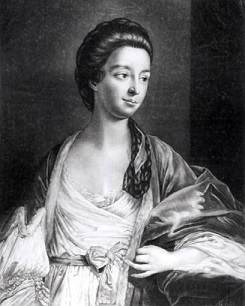
This promotion had been delayed somewhat by the death of Augustus’s father John in 1743, as John had not been shy about using his connections to help his son’s career. The following year, while on a furlough back in England, Augustus met Elizabeth Chudleigh. She was a maid of honour to Princess Augusta, the widow of Prince Frederick and mother to King George III. This was a prestigious position for the young woman who had received it as a parting gift from a former paramour, the Earl of Bath. However it was a position that was reserved for unmarried women so when she and Augustus’s whirlwind romance culminated in marriage it was kept a strict secret. The wedding took place at night in Lainston House, a stately home in Winchester with a private chapel. [3] It was an ill-fated marriage, as both were chronically unfaithful, but for the moment they managed to make up after their fights.
Augustus was eventually put in charge as commander of the ship HMS Porcupine, capturing a French privateer and earning himself a good prize out of it. This got him a promotion to full captain, and his first command after his promotion to captain in 1747 was to take HMS Princess out to the Mediterranean. There it became the flagship of Admiral John Byng. With that duty discharged, Augustus took command of a new ship and began winning prizes again. He also began making conquests in ports as well as at sea. Florence became his new favourite place when he discovered that not only were the local women free with their pleasantries, the local men were much less likely than in the rest of Italy to decide to murder their wives’ lovers. Adventures could, after all, be taken too far.
In 1748 Augustus was stationed out of Lisbon for a while and took the opportunity to reunite with his old friend Elena Paghetti. She was delighted to renew their acquaintance, and he described her as “still very handsome”. He also found a like-minded soul in the form of Charles Gravier. Charles was a junior French diplomat at the time, but he would go on to become the Foreign Minister for Louis XVI in the years that led up to the French Revolution. There was a third friend who is described as “the duke of Bagnos”, though this doesn’t appear to be the name of an actual duchy. [4] The three allegedly visited thirty brothels in a single night, according to Augustus’s memoirs at least. They also visited the infamous Convent of St Denis in Odivelas near Lisbon, where the nuns were a lot less virtuous than their vows would have dictated. To have a nun as a lover was considered quite stylish in Portugal at the time, and King John V had at least three children by the nuns in the convent. This included one with his long-term mistress Paula, who was the abbess of the convent.
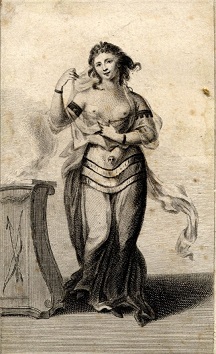
Though Augustus had been epically unfaithful to Elizabeth, he was still furious when he returned to London to hear the stories of her affairs (most notably with the Duke of Hamilton). In her defense, he had sailed off to the Mediterranean when she was pregnant, and she had been forced to conceal first the birth of their son, and then the death of that child only a few weeks later. It was a terrible burden for her to bear with no support from her distant spouse. He wanted a divorce but Elizabeth preferred to pretend that their marriage had never happened. So he left London in 1750, swearing to never reconcile with her. At the time he was a “Post-Captain” – a naval officer with the rank of captain, but without a ship to command. This left him effectively as a gentleman of leisure, drawing half-pay, until a ship became available. He was free to go where he wished, and so he decided to visit the capital of a country he had won several “prizes” from – France.
In Paris he fell in love with the city, and soon embarked on a whirlwind series of conquests. One of his early paramours was Madame la Marquise de Monconseil, a society beauty and a correspondent of Philip Stanhope. However the woman who had the most impact on him was Susanne-Felix de Caze, a woman who had been groomed as a royal mistress from a young age. She had been blocked from that position by the king’s obsession with Madame de Pompadour though, and so had been married off to a wealthy husband. Augustus became obsessed with her and pursued her tirelessly, until she finally relented and the two began an affair. By the time Augustus left Paris in December of 1750 Susanne-Felix was pregnant, almost certainly with his child. Motherhood seems to have settled her however, and though the two kept up a correspondence for a time she soon broke it off. She had decided, she told him, to be thereafter a faithful wife.
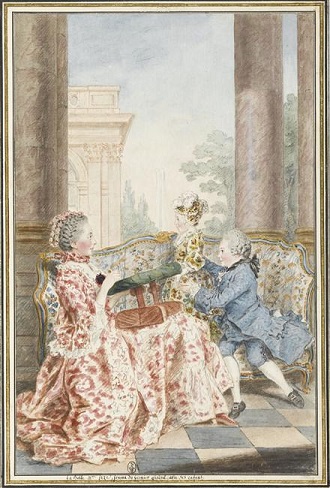
In 1752 Augustus was given command of the HMS Phoenix, and sent to patrol the Mediterranean. It was a soft posting in peacetime, and he spent the next few years sailing around the ports and having a truly amazing number of affairs. He had his own personal cook on board, and often hired musicians for ship board parties. For a brief period he even had two leopards and an antelope on board the ship, gifts he had been given while docked in Algiers. Even more notable were the six months he had a Mademoiselle Sarrazin from Marseille and her maid travelling with the ship, to the scandal of the crew. Augustus didn’t care, as in his words Mademoiselle Sarrazin was “a delightful fine woman … cheerful and ready to oblige”. Indeed.
His amorous adventures were not entirely shipbound, and one of the most perilous came while his ship was docked in Genoa. At a party a woman named Madame Pallinetta Brignole caught his eye, and he persuaded her to retire early complaining of an “eye infection”. Augustus himself soon ostensibly left, secretly returning through a window and sneaking into her chambers. The pair were having a fine time when Pallinetta’s husband nearly ruined everything by coming to see how his wife was feeling. While Augustus hid under the bedclothes the oblivious husband produced a selection of Indian silk handkerchiefs that his wife could use to try to soothe her “infected” eye. Luckily for Augustus and for the reputation of the British Navy, the husband left after a few minutes leaving him:
…in the arms of the loveliest woman there ever was. I lay until daylight and performed wonders.
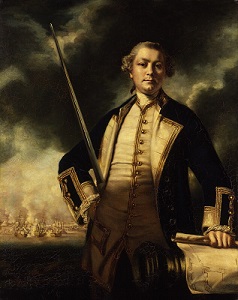
Sadly for Augustus the British Navy didn’t exist simply to give him the opportunity to travel around Europe and sleep with other men’s wives. Luckily though the rising tensions with the French offered the opportunity of much profit instead. In 1755, on the eve of the Seven Years War, Augustus received orders to begin seizing French merchantmen and taking them to port in the British-owned island of Menorca. Since war hadn’t yet been declared the merchants didn’t anticipate this attack, and “Phoenix” captured so many ships that Augustus was anticipating around £14,000 in prize money when they were sold. Unfortunately for him though the French had other ideas, and dispatched their navy to conquer Menorca and regain the ships.
Britain and France had been fighting for two years in the American colonies by this point, but historically there was considered to be a definite divide between colonial struggles and European struggles. The open piracy of the British fleet in the Mediterranean had raised the stakes though, and the French were bound to respond. The speed of their response caught the British by surprise though, and by the time Admiral Byng brought a fleet of ten warships from Gibraltar to defend the island it had already been overrun. Augustus had managed to escape and he joined Byng’s squadron. The Phoenix was not suitable to take part in the fighting, so Augustus took the role of chief observer, recording the events of the battle for later consumption by the admiralty.
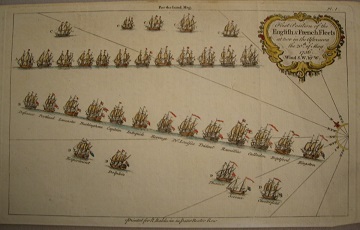
What he recorded was something considered almost unthinkable by the British public at the time – a solid British naval defeat. A sickness on board Byng’s ships had left them undermanned, and they were not able to mount a solid attack. The French took advantage of this and forced them back. Several of the British ships were put out of action, while the French suffered no such casualties. This led Byng to order a retreat to Gibraltar. By the time the fleet was able to reorganise, the the island was firmly in French hands and could not be retaken. Menorca (and Augustus’s £14,000 in prize money) was lost.
The defeat was a massive shock to the British Navy’s invincible reputation, and the public demanded a scapegoat. The true cause was probably the complacency and unpreparedness of the Board of Admirals, but since they were the ones responsible for investigating the cause they decided to look elsewhere. Admiral Byng, who admittedly hadn’t fought a very determined campaign, was the obvious person to blame. Under the British Articles of War, failing to “do one’s utmost against the enemy” was a court-martial offense with a penalty of death. A court was convened, and Byng was tried by a panel of captains in December 1756. Augustus (in his role as official observer) did his best to defend his mentor and friend, but he was unsuccessful. Admiral Byng was found guilty of the charges in January of 1757.
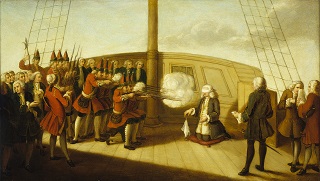
The charge carried a mandatory death penalty, though the court recommended mercy. Such mercy was given at the King’s discretion however, and as with the case of William Dodd Admiral Byng fell victim to a fit of royal pique. At the time the King was in a feud with his prime minister Pitt the Elder, and so when Pitt asked for mercy the King refused (at least partially to spite him). So on the 14th March 1757 Byng was executed by firing squad on the deck of the “HMS Monarch”. Byng’s execution was immortalised by Voltaire in Candide with the joke that it was good to execute an admiral every now and then pour encouragez les autres.
The war between the European powers known as the Seven Years War has sometimes been called “the real First World War”, as it not only engulfed Europe but also spread out across the world to their colonies. Augustus was deeply upset by Byng’s death, but he had little time to mourn. Through the rest of the 1750s he distinguished himself in Mediterranean battles, and in 1760 he transferred out to the western Atlantic. He took part in the conquest of the French colony at Martinique, and played a key role in the Battle of Havana against the Spanish. In 1763 he took command of the British fleet in the Mediterranean, which would had probably meant a promotion to Commodore if the war had not ended almost immediately after that. With the end of the war Augustus Hervey took the decision to retire from active naval duty after almost thirty years of service.
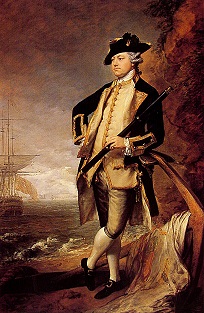
On his retirement, Augustus was named a Groom of the Bedchamber to the king (a mostly honorary title, though they sometimes acted as organisers and fixers for the monarch). He had also been a Member of Parliament for Bury St Edmunds 1757, though once he was actually back in the country he decided not to stand in the 1763 elections. His brother took the seat from 1763 to 1768, while Augustus was Chief Secretary for Ireland. In 1768 Augustus decided to take the seat and go to Parliament again. And then in 1769 his wife Elizabeth came back into his life, bringing trouble with her.
By now Elizabeth had become the long-term mistress of Evelyn Pierrepont, the duke of Kingston-upon-Hull. They waned to get married, but by now rumours of her secret marriage to Augustus were widespread. Elizabeth didn’t want the scandal of a divorce though, which was a decision she would come to regret. She instead went to the courts for a suit of “jactitation”. This was a legal device used to stop someone falsely claiming that they were married to someone else, and as such was proof that no such marriage existed. With that in hand, she married Evelyn in 1769. It was a happy but short marriage, as Evelyn died four years later in 1773. He left all his property to Elizabeth, on the condition that she not remarry. [5]
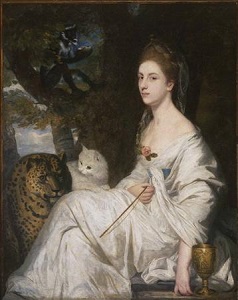
In 1771 Augustus met Mary Nesbitt, a former artist’s model who had like him been an infamous romancer in her youth. Her maiden name had been Mary Davis, and her association with the Hellfire Club gave her the nickname of Hellfire Davis. The two were well matched in temperament, and settled down together in non-marital bliss. The same year Augustus was made First Naval Lord, a new title. Previously the office had been “Senior Naval Lord”, and was given to the “first among equals” leader of the Board of Admiralty. Augustus’ new title was the beginning of a recognition that the navy required executive authority and was part of the trend towards military professionalism beginning across Europe at the time. He held the office for four years, until 1775 when his brother George died. Augustus inherited the title of Earl of Bristol and a seat in the House of Lords, and so decided to retire from the Admiralty. Ironically this was recognised by his promotion to Rear-Admiral (the lowest rank of admiral).
In 1775 Evelyn Pierrepont’s nephew Evelyn Medows brought a charge of bigamy against Elizabeth. He hoped to upset the will, and take his uncle’s fortune for his family by showing that her marriage to Augustus Hervey was real and so that her marriage to Evelyn was not. Elizabeth was living in Europe at the time, but she returned to England to face the charges. She had hoped to use the earlier judgment of jactitation to get the suit set aside, but this was rejected. As a peer of the realm, Elizabeth was considered to be above the normal criminal courts so she was tried by the House of Lords in early 1776. By 116 votes to none, they found her guilty. Whether Augustus was one of those 116 votes is not recorded. Elizabeth paid her fine and fled for the continent before the Medows family could bring any suit against her, allowing her to retain her fortune. She spent the rest of her life in France, Italy and Russia.
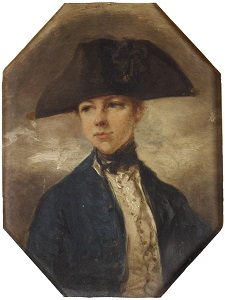
With the legitimacy of his marriage to Elizabeth established, Augustus petitioned for a divorce so that he could marry Mary, but this was not granted. Before he could push the issue, he fell ill. He died in 1779 of “gout of the stomach”, an old diagnosis that may have meant stomach cancer or a similar ailment. He had no legitimate offspring, though he had at least two children by other men’s wives, and a recognised illegitimate son who he had sponsored into the Navy. That son died around the same time as Augustus, in a naval battle over Gibraltar. He left most of his property to Mary, and his title to his younger brother Frederick.
At the time Augustus was was considered a side character in the scandalous tales of Elizabeth Chudleigh, but the publication of his journals changed that. They covered his time in the navy from 1746 to 1759, and have become a valuable resource for historians looking for insight into both European high society and life in the Royal Navy at that time. It was Augustus’ extra-curricular activities that made him infamous, though. The journals detailed his affairs with at least fifty-eight women, most of them married. He gained the posthumous nickname of “the English Casanova” for his exploits. An affectionate nickname, thanks to the double standards that let a man be a Casanova when a woman like Elizabeth was “a trollop”. Whether it was the legacy he’d have wanted is hard to say, but none of us ever get to choose how we’re remembered.
Pictures via wikimedia except where stated.
[1] Prince Frederick died before his father, and so never took the throne.
[2] Almost certainly because Pope had been roundly rejected by Lady Montagu when he tried to have an affair with her.
[3] It had been built by Charles II for his mistress Louise de Keroualle, the rival of Nell Gwynn.
[4] There was a nobleman living in Portugal at the time who had previously been Duke of Baños, but he was 71 at the time and was hardly likely to be getting up to these kinds of adventures.
[5] This condition pops up a lot in wills from around this time, and it’s never not creepy.
